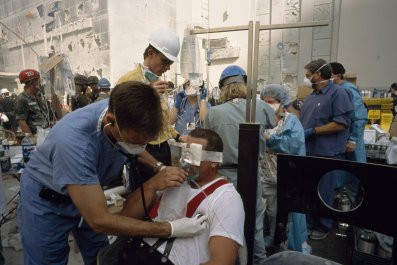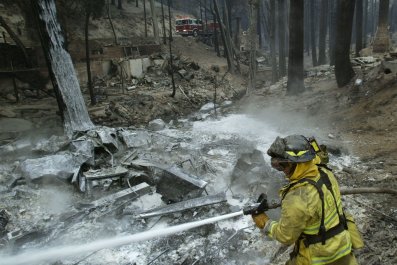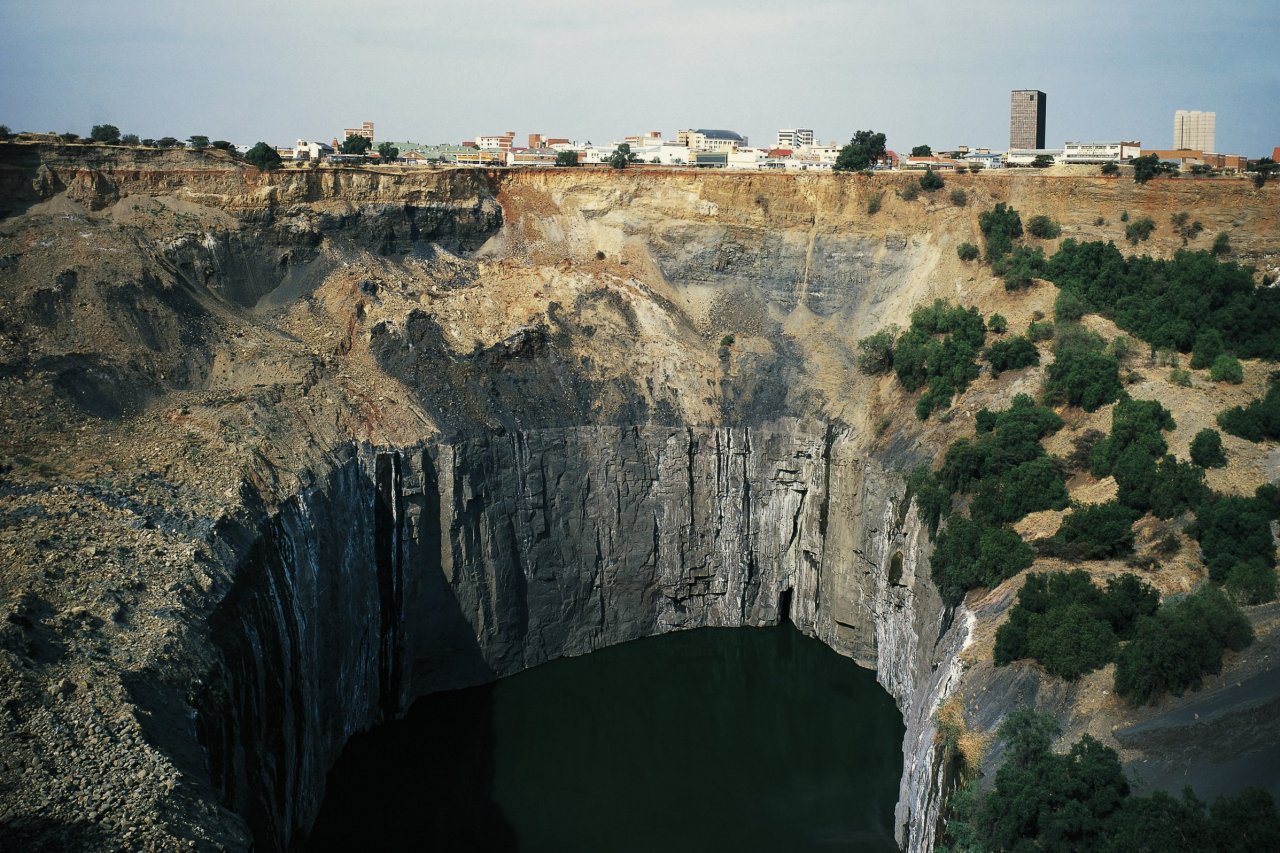
The last time Nonhle Mbuthuma spoke to Sikhosiphi "Bazooka" Rhadebe, she was sitting in the parking lot of a busy shopping center in the small coastal town of Port Edward, South Africa. For years, she and Rhadebe had been fighting to keep an Australian company from setting up a mine among the sand dunes and scattering of villages on South Africa's famous Wild Coast, where the two activists had grown up. Rhadebe warned Mbuthuma and Mzamo Dlamini, another anti-mining activist who was in the car that evening, that they were in danger.
"He said, 'Guys, please take care of yourselves,'" Mbuthuma recalls. Rhadebe, who owned several taxis in the area, alleged that members of their community who were in favor of the mine had drafted a hit list of anti-mining activists, and he was on it. "'I know why they put me at the top,'" Mbuthuma recalls her friend saying. "'If they strike my people, I will strike back.'"
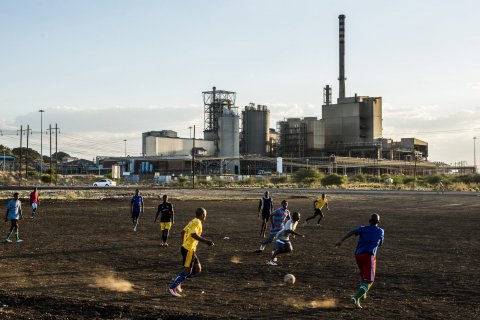
That evening—March 22—in the same shopping center parking lot in Port Edward, two young men on vacation from Johannesburg and sitting in their white Volkswagen Polo were hijacked at gunpoint by two men. The hijackers put one of the tourists in the trunk and tied the other up in the backseat without blindfolding him, according to Richard Spoor Inc. Attorneys, a law firm that has assisted members of the local community in contesting the efforts of the Australian company Mineral Commodities Ltd. (MRC) to set up the mine through a subsidiary. (The details of this account came primarily from the law firm.)
The hijackers drove the Polo a few miles out of town, into Eastern Cape province, according to the firm, to Lurholweni, where Rhadebe had a garage complex for his taxi business. Sometime between 7 and 7:30 p.m., the car pulled down the dirt road leading to the property. The men had affixed a blue light to the roof of the vehicle and identified themselves as police officers to Rhadebe's 17-year-old son, who was on the property when they arrived. In a statement to police that was seen by attorneys, Rhadebe's son said the men weren't in uniform and were wearing gloves, which he thought was suspicious, and they were speaking Zulu, not Xhosa, the more common language in the area.
The complex includes living quarters. Rhadebe was in the building and was getting ready to take a bath when the men approached the building. He asked them to wait a moment, but they pushed their way in and demanded he come with them, citing the investigation of the death of another taxi owner in the area. They marched Rhadebe outside, but when the men tried to force him into the car, he resisted. One or both of the men shot Rhadebe multiple times as his son watched from several yards away. The assailants then sped away, with the two young tourists still inside the car. The hijackers left the two tourists and their car in Port Shepstone, about an hour's drive from the scene of the crime.
Mbuthuma, meanwhile, had returned from the shopping center to her home and tended to her young son, who was ill. She was watching television with him when she got the call from Rhadebe's brother saying her friend had been shot. Mbuthuma immediately drove to Rhadebe's garage.
"The first thing I saw were his shoes," Mbuthuma says. Rhadebe always wore the same striped plastic sandals, and when she pulled up to the drive where ambulances and police cars were already parked, she saw his sandal-covered feet sticking out from under a blanket. "I was moving closer to the body, and I saw a stream of blood. I stopped."
Seven months later, the investigation into Rhadebe's death is still underway. A spokesperson for the Hawks, the special police unit investigating Rhadebe's killing, said the unit was still working on the case but declined to comment further. Mbuthuma and Dlamini are convinced their friend was not just a random crime victim. They're convinced he was targeted in retaliation for his campaign to prevent the mine from being opened—a battle that continues to this day and has echoes all over this troubled, beautiful country. "If they think they took out one person and resistance would stop," Dlamini says, "they are wrong."
Resource Curse
Mining has delivered great gifts to South Africa. And it has taken a great toll. The country's gold and diamond rushes in the 19th century laid the foundation for the nation's shift from being a largely agrarian society to the industrialized economy it is today. Minerals and precious stones made up a quarter of the nation's exports in 2015; South Africa is also the world's largest platinum producer and is home to the world's largest platinum-group metal reserves. But for decades that wealth did not enrich the majority of South Africans; instead, it helped pave the way for apartheid, the racist system of government that gave the country's white minority power over its black majority.
Black African workers drove the profits of white-owned mining companies. As the demand for cheap labor grew, the South African government introduced measures that forced black farmers off the land and into the mines' workforces. After segregation was institutionalized under apartheid in the mid-20th century, white-owned mining companies continued to flourish, although they were eventually hit by the international sanctions that helped bring the regime to an end in the early 1990s.
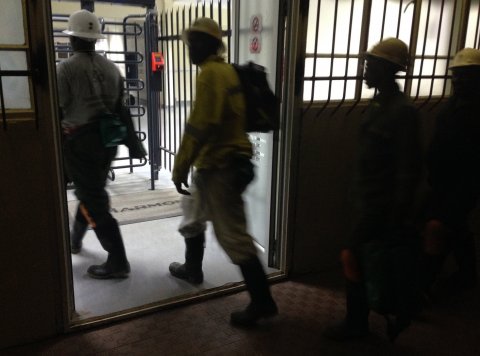
As part of the broader post-apartheid effort to transform the economy, the country's new mining laws stipulated that at least 26 percent of every mining company be divested and go to black investors, mostly through deals with black-controlled companies known as black economic empowerment companies. Democratic-era laws also stipulate that, as part of the intention to create "equitable access to and sustainable development of the nation's mineral and petroleum resources," South Africa's mineral wealth belongs to the nation. The government, as the custodian of that resource, regulates the sector.
The state can grant a company the right to mine land without the approval of people who live there, experts say, but the company is required to first consult with residents in the area. The terms of that consultation, however, are vague, raising particular problems in areas where traditional leaders hold sway. A company might talk with an area's chief and get his nod of approval, only to discover that other members of the community feel they have been left in the dark. "Some communities might wake up, and they might find drills in their piece of land without having been consulted," says Vusi Mabena, a senior executive at the Chamber of Mines, an industry body. "That's a shortcoming of the law."
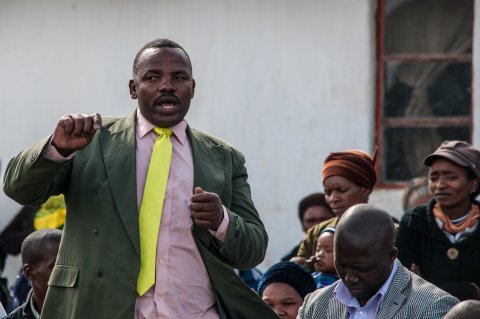
Although only about 13 percent of the land in South Africa is communally owned, that land includes some of the country's richest mining areas. In some places, like Xolobeni, residents disagree over whether the mine should be there; in others, the disputes erupt over how the owners of a mine should compensate people who have to be rehoused to make room for a mine. "This is a source of huge conflict in South Africa," says Richard Spoor, the human rights lawyer whose firm is advising the anti-mine members of the Xolobeni community. "There are dozens of these disputes around the country."
If residents in mining areas are unhappy, so too are mine owners and executives. The complicated mining law and clashes with communities pose serious threats to the industry, says Peter Major, director of mining for Cadiz Corporate Solutions, a South Africa–based mergers, acquisitions and capital-raising company. Foreign investors are losing interest in South Africa, despite its enormous mineral reserves, because of the increasing difficulty of doing business, he says. "We have virtually every darn mineral known to man here— and in economic, easy-to-access deposits too," Major says. "God did everything he could to help us, and our own country is doing everything to stop it."
Mining still generates hundreds of thousands of jobs at a time of record-high unemployment. But it's facing other challenges: The global commodities crash and decreasing demand from China have caused the industry to shed thousands of jobs, and in May, a court ruling paved the way for hundreds of thousands of mine workers who contracted lung diseases on the job to proceed with a class-action suit against mining companies, the largest such suit in the country's history. The journey of mining in South Africa, Chamber of Mines President Mike Teke said in a speech in May, has been "mostly bleak, caught in violent storms." The killing of Bazooka Rhadebe, whatever the motive, was a particularly brutal blow for the industry.
Beneath the Sand
On a late autumn day in May, I drove south from Port Edward, crossing the Mtamvuna River, the northern border of Pondoland, which is home to the Pondo people and the site of a famed uprising in the mid-20th century against the apartheid system. The blingy Wild Coast Sun Casino was the last vestige of the lucrative beachside tourist trade before I reached Pondoland's grassy hills and stretches of sand dunes.
The problems on the Wild Coast began more than 10 years ago, when MRC concluded those dunes could have vast reserves of ilmenite, a mineral that can be processed into titanium, the light but strong metal used in everything from toothpaste to airplanes. The company has estimated that the area could be home to the 10th-largest heavy mineral deposit in the world.
After finding evidence of the deposit, a South African company called Transworld Energy and Minerals Resources (SA) Pty. Ltd., owned by MRC and its black empowerment partner, Xolco, was granted prospecting rights in the area in 2005 and applied for mining rights in 2007. A provisional mining right was granted to TEM in 2008, but the then-minister of mineral resources withdrew that decision in 2011, citing environmental concerns over the project. In 2015, the company applied again. It estimated the mine would generate some $4.5 billion over its 22-year life, bringing hundreds of jobs and improving the area's anemic infrastructure, focusing on schools in particular. "We believe that the project has the capacity to be the catalyst for social transformation of one of South Africa's poorest communities," MRC said in a statement to Newsweek in May.
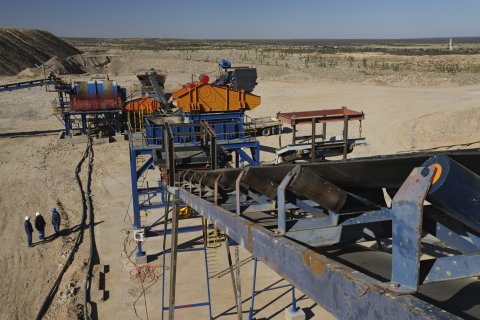
The proposal faced strong opposition from its early days. For members of the Amadiba Crisis Committee (ACC), the local anti-mine organization Rhadebe chaired, the trade-off was never worth it. "They said they were going to build roads, schools, clinics, bring electricity and water, and employ people," says Mbuthuma. But she and others felt that the mining process would destroy the land where they live, keep livestock and grow food. "Once [the mine owners] finish their business, they pack their bags and leave…and you're back to square one, but you can't use your land because it's been destroyed."
The dispute has divided families and made enemies of childhood friends. Soccer games have dissolved into confrontations between pro-mining and anti-mining groups. Things got worse after TEM's 2015 application, ACC members say, with clashes breaking out in the remote villages and both sides accusing the other of instigating the violence. Paranoia settled over the place. People worried about being poisoned by their neighbors, and after Rhadebe's death, both Mbuthuma and Dlamini started traveling with security guards. Everyone was spooked.
'It's Not Safe'
Leaving suburban Port Edward behind, I drove into the remote Amadiba area with Sibusiso Mqadi, another ACC member, who promotes organic farming in the area and is a tour guide at a local lodge. As we drove toward the coast, the paved roads gave way to dirt roads, which gave way to rutted grass tracks. There is no running water here and no electricity, Mqadi explains. We passed a few small outposts that served as local shops. Kids eyed us curiously as they made the long walk home from the villages' schools. It was a stark contrast to Port Edward a few miles away—more beautiful, and much tougher.
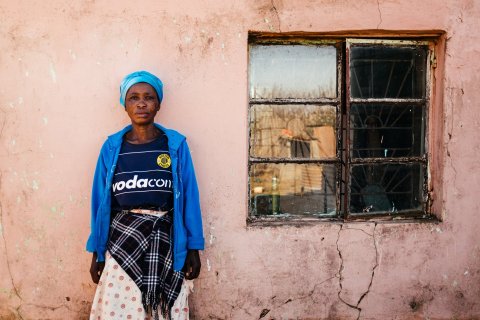
The people I spoke to that day were determined to preserve the area's natural beauty, even if that meant continuing to live without many basic amenities, like running water and decent roads. Mampofuna Ndovela, a woman I met as she was bringing a large bucket of water home, says she was worried that if the mine came she would have to relocate from her homestead, where she grows and sells vegetables to support her nine children. "We can't bring our goats and cattle to Port Edward," she reasons. In December, she says, a group of people who supported opening the mine came to her house and threatened her family for speaking out against the project. She spent the next month sleeping outside in the bush with her children, worried they would come back. "It's not safe," she said.
Early the next morning, I met Zeka Mnyamana inside a mostly empty Kentucky Fried Chicken restaurant in Port Edward. Mnyamana grew up in the same village as Mbuthuma but now lives in Port Edward and acts as a kind of voluntary spokesman for the pro-mining community members. He says that the mining presents an opportunity for the area, which he says needs better schools, water, electricity, roads and, most of all, jobs. "We are sending our children to school, but at the end of the day, they need to work," he says.
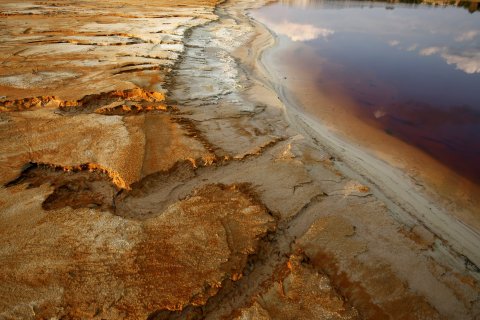
With no work, they'll end up in the shebeens, he says, using the local name for pubs. "They will go, and they will drink, and their future will end there. The mining is going to create jobs for the people." Several people from the area are working at a mine operated by MRC in the Western Cape, and they are bringing money back, he says. "We want the project to go ahead. We think it's the only big project that is going to change our lives."
Mnyamana sounded glum about the schism between residents in the region. He has known the ACC leaders for a long time, he says. But he also accused the group's supporters of using violence and intimidation to further their cause. When we got to talking about Rhadebe's killing, he declined to discuss it. "God knows we are innocent," he says.
Selling Up
On July 18, MRC announced in a statement that it had entered a memorandum of understanding to divest its 56 percent interest in TEM in favor of its black empowerment partner, Keysha Investments 178 Pty. Ltd. "In light of the ongoing violence and threats to the peace and harmony of the local Xolobeni community, the Company accepts that the future viability of the Xolobeni Project should be managed by stakeholders and organisations exclusively owned by South African people," the statement said.
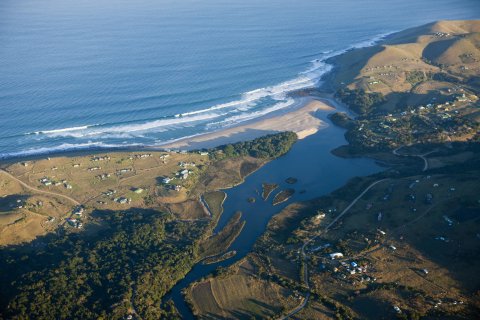
MRC and its chairman, Mark Caruso, have initiated legal action against three people for statements they allegedly made in the media that the plaintiffs say implied the company was involved in violence or corruption in the community. Caruso was not available to be interviewed for this article, according to a company spokesperson. In its March quarterly report, MRC strongly refuted any suggestion that the company or its subsidiary had anything to do with Rhadebe's death, calling any such allegations "spurious, defamatory and without any factual basis."
The company's about-face on Xolobeni could scare off future investors in the sector, says Major, the mining analyst. "Foreigners are saying, 'Jeez look at this.' The guys have had that deposit for more than 12 years. They have done everything requested of them numerous times, and they've spent millions," he says. "This just sends out a bad signal to the whole world."
In recent weeks, things have been quieter around the controversial sand dunes, Dlamini and Mbuthuma say. When I spoke to them on the phone from Johannesburg, both sounded wary of what will happen next. Keysha could make a renewed push to open the mine. MRC's divestment "was treated as a victory, but the community on the ground is extremely skeptical, and rightly so," says Brendan Boyle, a senior researcher at the Land and Accountability Research Centre at the University of Cape Town. "The notion that a community has a right to say 'no thanks' is not gaining any traction." Bazooka Rhadebe may be gone, but the battle he fought—for the right to say no—lives on.













